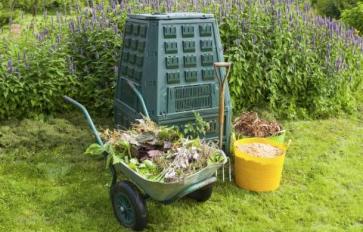
Did you know April is Earth Month? This spring month is dedicated to advocating for a greener, healthier earth (even though every month should be earth month). Here are a few creative ways you can celebrate and make the world a little greener this month.
Go zero waste
Perhaps one of the best things you can do for the planet is decide to go zero waste. You might be wondering what zero waste even means. Essentially, being zero waste means you aim to reduce the amount of trash you produce on a daily basis. It's not so much about creating zero waste so much as limiting the amount we make. That may sound a little contradictory. However, being truly zero waste is close to impossible, simply because we live in a linear economy, not a circular one. The best we can do is to try though, and whatever amount of trash you're able to cut back on is always a win. The average American makes 4.4 pounds of trash per day, so it's important we realize waste doesn't just "go away".
If you're interested in joining the zero-waste movement, great! I promise it's not that hard when you get down to it. (Feel free to check out my site for more tips.) In the meantime, here are six ways you can start zero-waste living right now:
- Replace plastic straws with reusable glass, metal, or bamboo straws.
- Bring your own reusable tote bag to grocery stores and malls—stash it in your car if you're afraid you'll forget it!
- Stop buying food in plastic bags and use reusable produce bags instead—just grab some fresh package-free veggies and fruits and put them in your produce bag.
- Carry around reusable cutlery and refuse plastic cutlery—you can just put it in your bag and wrap it in a reusable napkin for sanitary purposes.
- Get a reusable water bottle—you'll never need to buy a plastic water bottle again.
- Invest in a travel mug—if you get a good quality stainless steel one, you can put both hot and cold drinks in it and they'll stay warm or cold for much longer.
These are designed to get you started, but in general, think about the single-use items in your life and look to replace them with reusables. Once you do, you'll be amazed at how much trash you save from the landfill (plus your wallet will thank you). It's that simple!
Organize or attend a park/beach cleanup
This earth month, get involved in your local community and help beautify your neighborhood. Do you frequently visit your local park or beach and see trash everywhere? Organize a cleanup, or attend one that someone else is hosting! Here are a few pointers to remember if you choose to organize an event yourself: Choose a place, time, and day to have your cleanup. Decide on how long the cleanup will be—just a few hours, half a day, or an all-day event? Next, get permission from the land manager to clean up the place, even if it's public land. Once you have permission, talk to local waste management to see if they want to sponsor the event by hauling away the garbage for free (or a discounted price). If they say no, recruit volunteers with pickup trucks and learn the location of the nearest dump and recycling center. Of course, in order to get volunteers, make sure you start gathering them by asking family, friends, neighbors, co-workers, and community groups to get involved. You can also create a Facebook event online to spread awareness of your cause, or even contact local news so the event can reach more eyes and ears. Don't forget the old-fashioned way by handing out posters and hanging them up at store fronts and local libraries. When cleanup day approaches, wait until everyone arrives and has enough supplies and knows their role. Be sure to separate all the trash from recycling (steel, aluminum, plastic, glass, etc.). Once all the trash is organized, you can send it off to the dump and recycling center. Consider giving your volunteers a (zero waste) picnic for a job well done and a chance to celebrate your achievements.
Reduce your meat consumption
Believe it or not, the meat industry is one of the leading contributors to climate change (specifically beef production). There are several reasons for this: First, on average, a pound of beef takes 1,800 gallons of water to produce. This huge water footprint is primarily due to the amount of water needed to grow grass, forage, and feed that a beef steer eats over its lifetime (not to mention water for drinking, cleaning and processing). Aside from water consumption, beef production alone results in cow manure, which produces high quantities of nitrous oxide (a greenhouse gas). This gas is also released in most other animal manure, but cows produce the most manure out of all livestock groups. Nitrous oxide is a greenhouse gas 298 times more powerful than carbon dioxide. Not to mention cows also produce methane when they expel gas, a greenhouse gas 25 times more powerful than carbon dioxide. If that wasn't bad enough, the meat industry also pollutes water ways: In fact, the meat industry has been blamed for the largest ever “dead zone” in the Gulf of Mexico. A new report states toxins from the meat industry's manure and fertilizer are being poured into waterways. This creates huge algal blooms, stripping oxygen from the water, making the water literally un-breathable for sea life. Thus, they're labeled “dead zones” where no animal will venture.
If you don't want to support this kind of behavior, and help the environment, please consider reducing your meat consumption. You don't necessarily have to become a full-on vegetarian or vegan to make a difference. Simply start by having Meatless Mondays or leaving meat off the plate for two out of three meals you eat a day. Your health (and the earth) will thank you.
Plant seeds or trees
One of the best ways to celebrate Earth day is by getting your hands dirty—with soil that is! Nothing beats growing something from seed or watching a tree grow. Give planting seeds a try if you're feeling adventurous—some easy plants to grow from seed are herbs like basil or mint. You can start them in empty eggshells by adding a little potting soil and placing one seed in each of them. You never know which will sprout! Then just transfer them over to a bigger pot – the eggshell will biodegrade naturally so no need to remove it—just cover it with soil.
If you'd rather try your luck planting a tree, look to your local community. Since April is Earth Month, there may be a tree planting event you can get involved with. Just google "tree planting event near me" and see what results pop up. If you have the space, and rather go it alone, look into planting a tree in your yard (front or back). Perhaps a tree that provides fruit, like an apple, citrus or mango tree, might interest you. Or maybe a tree that will complement the landscape of your yard. Look into trees that are native to your area and consider planting one of those instead of a more invasive species. Whatever you decide to do, there will be one more tree in this world, providing us with much needed oxygen. Mother nature will surely thank you!








